Not many people take anxiety in toddlers seriously and brush it off saying it is a joke. The fact of the matter is that anxiety in children under 10 does exist and parents need to handle it very carefully. Let me tell you about Little Miss A here. She started school in January this year and was very excited to attend school. She, in fact, cried during holidays to go to school. One week after the school reopened, she suddenly did not want to go and we had massive tantrums. When it continued for some time and I did not get an answer directly from her, I was worried. My mother pointed out that something is bothering her and then I carefully analyzed what had been happening. I realized one of her co-teachers had left school and she was not in her comfort zone there. It took me a few days to get her excited to go to school and adjust with the new teacher. And mind you, all this had to be done without directly talking about it.
The problem here was not handling the tantrums but figuring out and then dealing with it, as she could not herself understand and express what was bothering her.
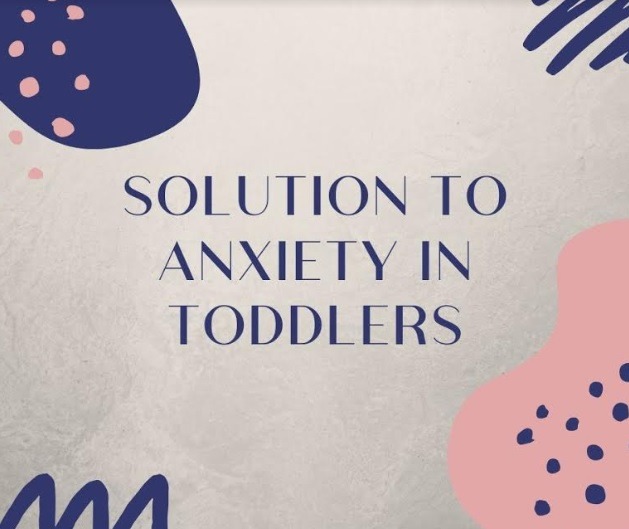
Table of Contents
Why Do Toddlers get Anxious?
When a baby enters toddlerhood, it is a very exciting and special phase of growth for them. This is because there is a lot they are learning and observing in terms of cognitive, emotional and physical skills. Their mind and their body, both undergo a lot of change. And unlike when they were babies, they feel the change and the difference. There are some very small things which can cause stress and anxiety in toddlers and you can see child anxiety symptoms.
What happens is that this is the age, toddlers begin to realize that things can happen differently as they expected it. Mummy can get angry and refuse a sweet, the friends can play with a toy they wanted or mummy can leave them in the playschool or darkness is scary. These are just a few examples, there are many things which can go wrong in their little heads. There are many things which might seem very trivial to the parents but can cause anxiety in toddlers. Parents need to be careful and notice signs and also find the things that trigger the anxiety.
Types of Anxiety
Before you understand the reason for anxiety in toddlers, you need to know the types of anxiety which can stress your little one. Between the age of 1 to 3 or 4, there are some very normal types. Let us talk about them:
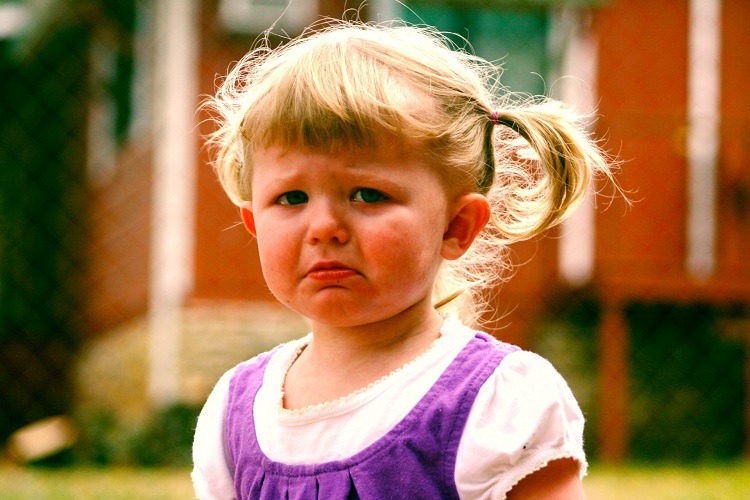
Stranger Anxiety
This is very common in toddlers as they get clingy and cranky when they see new faces. Many children take some time to get comfortable whereas some do not settle till the person leaves. Children get very anxious on seeing strangers between the age of 1 and 2 and you might notice such episodes later on too.
Separation Anxiety
This anxiety starts at about 18 months but goes into preschool years. When the parent goes from the room or leaves them with someone else, the children can cry and scream till you settle them back.
School and Day Care Phobia
The first sign of this is when the child cries and screams to not go to school. They will come up with vague excuses. This is an extension of separation anxiety but parents need to be careful to dismiss any issue of bullying or teasing.
Phobia
Some children develop a phobia for some particular thing or an animal. It necessarily does not have to be of something they see; it can be of things they have never seen as well.
Shyness
This is the only type of anxiety in toddlers which can carry on and there are chances the child does not outgrow. This can cause the child to be vary of joining a new class or withdraw when new people are around them.
Signs of Anxiety in Toddlers
Each child is different and a parent cannot simply look for some signs, in particular, to know the child is anxious. However, there are some typical symptoms like scared of being alone, excessive crying or getting nightmares. There are some more signs that you can look out for.
Separation Anxiety
The child will want the parent to be in sight at all times and when they do not find you, they panic. If you leave them, they cry and they will follow you everywhere.
Scared of New Situations
Toddlers can take time to adjust to new situations. And till the time they do not settle, they stick to the parent and even ask to leave from the place and not go inside.
Rigid
Some toddlers become very rigid in the way they want things are done. All kids like to stick to a routine but when the toddler is anxious, they throw a tantrum when things are not done as per their preference.
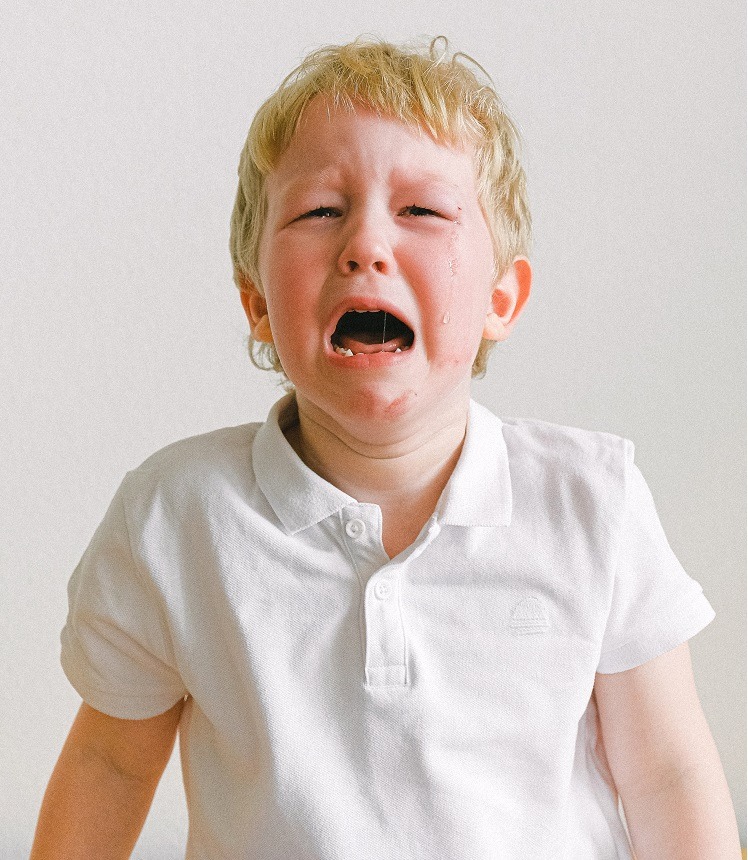
Tantrums
Tantrums are very normal in toddlers. But one major sign of anxiety in toddlers is they happen for more than 45 minutes and the frequency increases.
Problems in Sleeping
Anxious toddlers have a problem falling asleep and often wake up due to various reasons. Some will cry and say they had a bad dream, whereas some will just cry and want the attention of the parent or the caregiver.
Regression
Toddlers reach new milestones during this age, but an anxious toddler will show signs of regression. They can wet the bed at night or they can have frequent accidents during the day, if they are potty trained.
Other Issues
There are some things which can be signs of anxiety in toddlers. The parents can notice excessive fear or phobia or a sensitivity to sound or some issues like constipation or issues with food. Some children tend to bite their nails or suck their thumb or play with their hair.
Not all of the above are signs of anxiety but parents need to keep a check and look out for some unusual behavior suddenly. When we can recognize signs of anxiety in toddlers, we can find solutions to help the little ones too.
You may like to read our post, Hug Your Child When They are Being Horrible
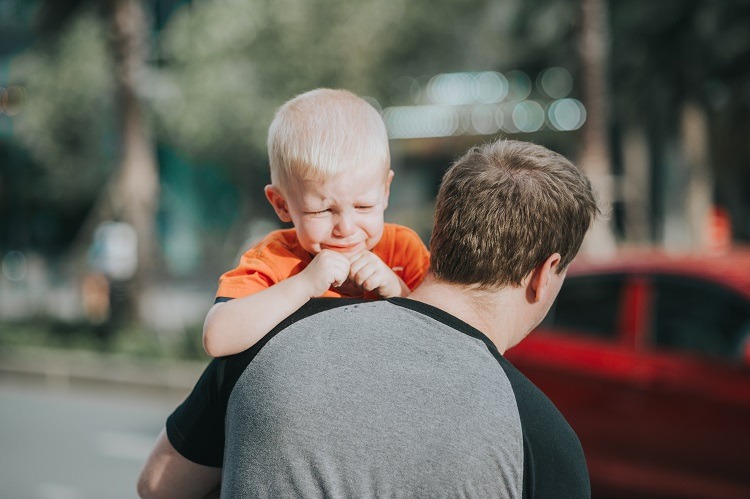
Causes of Anxiety in Toddlers
There was a phase earlier in the year when Little Miss A started school and I started a few classes too. My thought was that it was good to keep her busy in something constructive. I did not realize that this new schedule was too overwhelming for her. The running around was stressing her and the result was tantrums all the time. I gradually stopped a few classes and in no time, we had a happy child again. We do not realize many times that some events may be causing stress to the child. Some things that can cause stress are:
- Unexpected events
- Potty training
- Busy schedules
- Changes in the family
- Separation from caregiver
Solution To Anxiety in Toddlers
We have discussed what causes anxiety in toddlers, the kinds of anxieties and signs of anxiety. What is more important than any of these is the solution to calm the child. At the end of the day we all want a happy child and thus, our main aim is to help them.
Prepare them
This is one tried and tested way. With Miss A, every time we know she will have to face a major change we start talking about it well in advance and give her time to assimilate. For example, two months before she started play school, we often spoke about it and read her books. The transition was not very difficult. Similarly, before we finally potty trained her, we created excitement around it and she was trained in a week. Preparing the child of what to expect and especially in places you know they will have a problem will help. How a stressor is presented and managed to a toddler is a big deal. The key is to handle their feelings and not go into too many details which can stress them.
You may want to read our post, Want to Read the Right Toilet Training Age?
Stick to Normal Schedule
A daily routine gives a lot of comfort feel to the toddler and can reduce anxiety in toddlers. The bedtime routine or going to school or a day care or going to the park; stick to the schedule the baby is used to. If there is too much of a change, it will just add to the anxiety levels. A routine makes the toddler feel in control. When there are symptoms of anxiety avoid introducing new things like potty training etc. and postpone them. The child has to be in a comfortable space mentally to be able to learn new things.
Keep Calm and Assure Them
I know this is easier said than done but we need to acknowledge the feeling of the child and stay calm. This is a very delicate situation as sometimes you need to be with them but also expose them to events which are causing anxiety. Avoiding the problem is not the solution as they need to learn to fight it. You have to say things like “I know you will miss me when I am away but remember Mumma will miss you more and she will be more excited to see you once its home time.”” You will have fun in school and you will not even know when Mumma will be there to pick you”.
The language you use has to say that we will do what is needed to be done but I will always support you because I know how you feel. Try and reach the school on time so that they know Mummy did miss them. Small actions and careful language will help calm the toddler for sure.
Give More Hugs and Kisses
Anxiety is when a toddler is not comfortable about something and a hug and a kiss are the perfect way to give that comfort to them. A little extra attention and a few more cuddles will help the baby a lot. The child feels more confident and becomes easier with the changes or the stress factors which are causing anxiety.
You may like to read our post, Benefits of Hugging and Kissing Your Baby
Give Them a Break
Children are learning many new things and they process things slowly and work at a slower pace than us. We thus, need to give them breaks and time to rest. They will stop for everything new. What seems to be usual to you can be exciting for them. You have to give them time and not run like a machine at all times. They need a break and get adequate rest and naps to assimilate what is happening around them. Do not rush through the day with a child as an overwhelming schedule will cause too much anxiety.
Help Them
Toddlers have a problem to understand what they feel and even more problem to express themselves. You as a parent have to help them to understand the fear and how to overcome them. Talk to them, ask open ended questions, provide solutions, make stories around the problem etc. You are the parent and you will know what works best with your child. In case of Little Miss A, creating stories around things help her adjust to new situations.
Conclusion
Anxiety in toddlers is common and understanding child anxiety and symptoms and accordingly finding solution is very essential. Always remember, you are your child’s emotional coach. You must help them understand and express their feelings. When they learn to label them, they will eventually learn to handle them too.
Have you faced issues of anxiety in your toddler? Let us know how you managed the situation in comments.
You may like to read:
https://childmind.org/article/what-to-do-and-not-do-when-children-are-anxious/

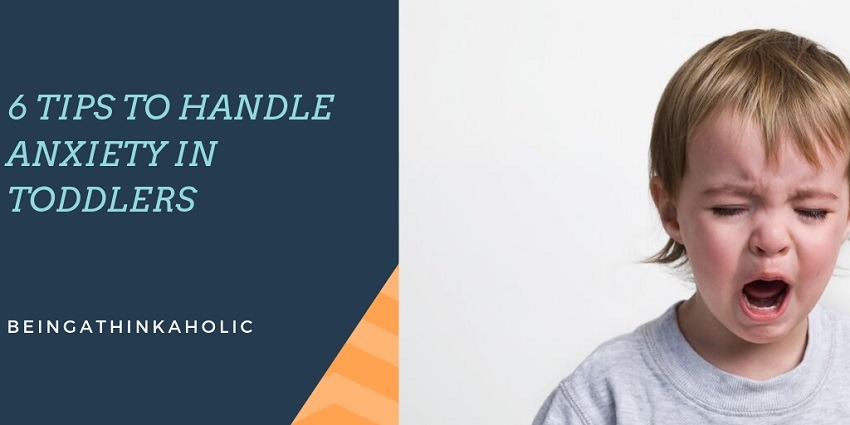



The most difficult part of parenting! These are some really great suggestions to parents.
Thanks. Glad you like the post. 🙂
This is a very helpful article. My son is three years old and bites his nails. Sometimes I do lose my cool but you are right we should be calm and handle them with love.
Thanks for reading, Glad you found the article helpful. My daughter had a habit of finger sucking. We have recently managed to get rid of her. Patience and love helps many times but we are humans too and it is natural to lose our cool 🙂
Very well-curated blog. Fully informative and useful. I loved it a lot. sharing it further.
#MyFriendAlexa #LovelyReads
Thanks so much for the appreciation. Means a lot to me 🙂
as a mother, I really needed this coz, my kid, really my daughter also becomes stubborn
Glad you find the post helpful. Thanks for reading. 🙂
Hi Arushi! This is such a sensitively and sensibly written article. I could identify so much with this article as a parent. Thank you!
Very sensible and sensitively written article, Arushi! Thanks 🙂
Thanks a lot for the appreciation. Glad you liked the article. 🙂
Extremely well-researched post. Parenting sure comes with various challenges. However, being a student of psychology, there is one thing I would like to add, anxiety in kids can also be a function of the home environment. Anxious/angry parents can also ignite anxiety in children. – maybe you can do a post on that too. Just a suggestion.
Keep writing such informative posts. #MyFriendAlexa #DiaryOfAnInsaneWriter
Wow, thanks for the suggestion and for the appreciation. Will definitely plan a post on this. 🙂
I love these tips. they are not only practical and absolute double also. I am sharing this with my friend,
Thanks for the appreciation Princy. Glad you like the post and thanks for sharing.
You have written about an issue isn’t often addressed because anxiety and kids seem to be unrelated. Very informative and insightful post.
Thanks for appreciating. Glad you like the post. 🙂
[…] (You may like to read our post, 6 Helpful Tips to Handle Anxiety in Toddlers) […]
[…] (You may like to read our post, 6 Helpful Tips to Handle Anxiety in Toddlers) […]
[…] (You may like to read our post, 6 Tips to Handle Anxiety in Toddlers) […]
[…] (You may like to read, 6 Helpful Tips to Handle Anxiety In Toddlers) […]
[…] (You may like to read our post, 6 Helpful Tips to Handle Anxiety in Toddlers) […]